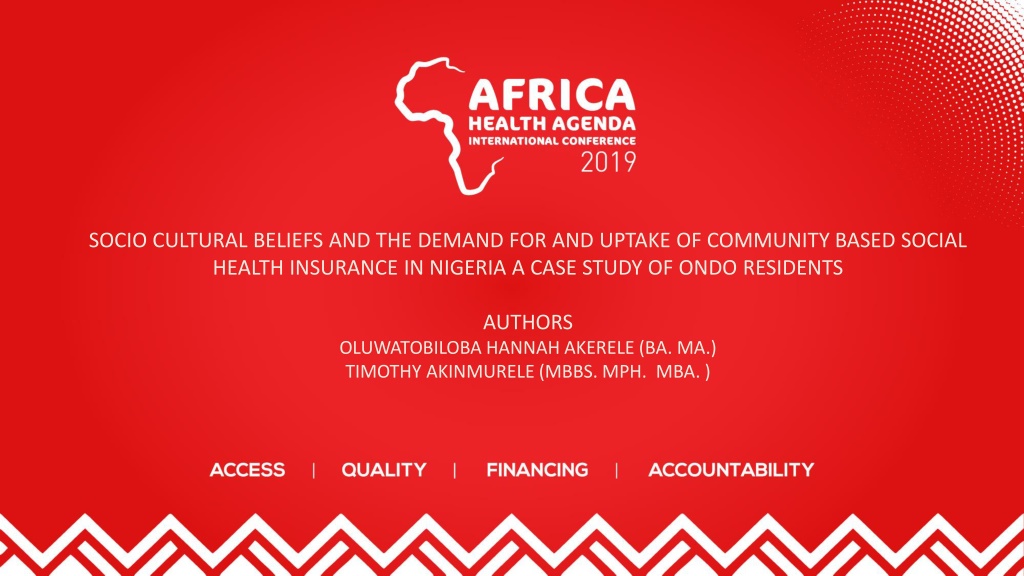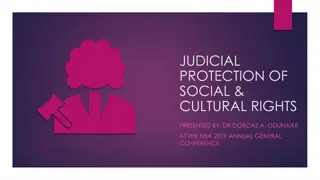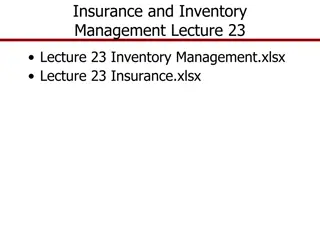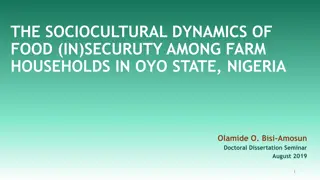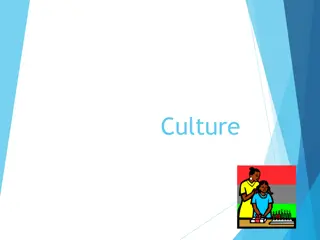Exploring Socio-Cultural Beliefs Impact on Community Health Insurance in Nigeria
In Nigeria, the demand for Community Based Social Health Insurance Programs (CBSHIP) is influenced by socio-cultural beliefs. This case study conducted in Ondo Residents delves into the challenges and opportunities faced in ensuring universal health coverage, particularly in rural areas. By examining the demand and uptake of CBSHIP, the study evaluates the effectiveness of interventions in promoting health insurance despite prevailing societal beliefs.
Download Presentation

Please find below an Image/Link to download the presentation.
The content on the website is provided AS IS for your information and personal use only. It may not be sold, licensed, or shared on other websites without obtaining consent from the author. Download presentation by click this link. If you encounter any issues during the download, it is possible that the publisher has removed the file from their server.
E N D
Presentation Transcript
SOCIO CULTURAL BELIEFS AND THE DEMAND FOR AND UPTAKE OF COMMUNITY BASED SOCIAL HEALTH INSURANCE IN NIGERIA A CASE STUDY OF ONDO RESIDENTS AUTHORS OLUWATOBILOBA HANNAH AKERELE (BA. MA.) TIMOTHY AKINMURELE (MBBS. MPH. MBA. )
CONTENT OF PRESENTATION Background Problem Statement Research Objective Theoretical Construct Methods Findings Conclusions Recomendations
SOCIO CULTURAL BELIEFS AND THE DEMAND FOR AND UPTAKE OF COMMUNITY BASED SOCIAL HEALTH INSURANCE IN NIGERIA; A CASE STUDY OF ONDO RESIDENTS BACKGROUND In recent times, global health and development efforts have been geared towards achieving Universal Health Coverage (UHC) with emphasis on coverage for the disadvantaged in the society. The 2018 Revision of World Urbanization Prospects of the UN Department of Economic and Social Affairs (UN DESA) has listed Nigeria as one of the three countries which will account for 35% of the projected growth in the world s urban population growth between 2018 and 2050 with additional 189 million to Nigeria s current urban population [1].
SOCIO CULTURAL BELIEFS AND THE DEMAND FOR AND UPTAKE OF COMMUNITY BASED SOCIAL HEALTH INSURANCE IN NIGERIA; A CASE STUDY OF ONDO RESIDENTS BACKGROUND CONT D This suggests that the wide Urban-Rural divide is a major reason rural areas develop slowly and lack basic amenities that ensure Universal Health Coverage (UHC). This unmet health needs in rural and underserved areas lay emphasis on the need to equal access to quality healthcare for the informal sector and people at the grassroots. In line with these, Community Based Social Health Insurance Programs (CBSHIP) is technically facilitated in Nigerian communities as a means to achieve Target 3.8 of SDG 3 which is to achieve universal health coverage, including financial risk protection, access to quality essential health-care services and access to safe, effective, quality and affordable essential medicines and vaccines for all.
SOCIO CULTURAL BELIEFS AND THE DEMAND FOR AND UPTAKE OF COMMUNITY BASED SOCIAL HEALTH INSURANCE IN NIGERIA; A CASE STUDY OF ONDO RESIDENTS BACKGROUND CONT D Ondo is a town located in Ondo State, Nigeria . The state is made up of 18 Local Government Areas (LGA) with a population of over 5,029,786 [1] . Available statistics indicate that the budgetary allocation for health in Ondo State was about 4.8% of the state s annual budget in 2017. This is far lower than the WHO recommended 15%. Barely 2% of Nigeria s population are covered by the National Health Insurance conference [2]. Through the ages, social organization has been rooted in the ability of community members to form common experiences based on their culture and belief systems. Thus, predominant socio-cultural belief in communities individuals guide the demand and uptake of CBSHIP. Hence, this study investigated the demand and uptake of CBSHIP among Ondo residents and examined the effectiveness of Social and Behaviour Change interventions on Moferere Oja Mutual Health Association s (MOMHA) CBSHIP scheme despite pre existing socio-cultural beliefs.
SOCIO CULTURAL BELIEFS AND THE DEMAND FOR AND UPTAKE OF COMMUNITY BASED SOCIAL HEALTH INSURANCE IN NIGERIA; A CASE STUDY OF ONDO RESIDENTS Problem Statement Over (70%) of Nigeria s population who are mostly rural dwellers and live in poverty pay out of pocket for healthcare services [2]. Many CBSHIP schemes operating in Nigeria, have been hampered by low enrolment rates, limited resource mobilization and poor sustainability [3]. Research Objective The need to examine Ondo residents socio-cultural belief system, their demand and uptake of Community Based Social Health Insurance informed this study. Theoretical Construct The traditional social action which is one of the ideal types of Max Weber's social action theory served as the theoretical basis for the study.
SOCIO CULTURAL BELIEFS AND THE DEMAND FOR AND UPTAKE OF COMMUNITY BASED SOCIAL HEALTH INSURANCE IN NIGERIA; A CASE STUDY OF ONDO RESIDENTS Research Questions (RQs) What is the level of importance Ondo residents give to CBSHIP based on their pre dominant socio cultural beliefs. What relationship exists between Ondo residents socio cultural belief system and the demand for and uptake of CBSHIP. What is the role of Social and Behaviour Change Communication Interventions in increasing Ondo residents demand for and enrollment on MOMHA s scheme despite pre existing socio cultural beliefs. Methods In a bid to suggest research based solutions to the fore mentioned RQs, a cross sectional mixed methods study was conducted. In-depth interviews were conducted with three residents of Ondo who are also indigenes of the town to assess the socio-cultural belief system in Ondo. Two hundred and fifty copies of the questionnaire about respondents socio-cultural beliefs and demand for CBSHIP were administered to Ondo residents and Observational data were collected during Social and Behavior Change Communication intervention to increase enrollment on Moferere Oja s Mutual Health Association s CBSHIP. Questionnaire data were analyzed with the Chi-square method, ten null hypotheses were formulated and tested at .05 level of significance.
SOCIO CULTURAL BELIEFS AND THE DEMAND FOR AND UPTAKE OF COMMUNITY BASED SOCIAL HEALTH INSURANCE IN NIGERIA; A CASE STUDY OF ONDO RESIDENTS Findings The findings indicate a statistically significant relationship between Ondo residents socio-cultural belief system and demand for CBSHIP because p value is less than 0.5 and equal to 0.025. This is presented in the table below. Good/High Low/Poor In between Indicators Ondo adherence socio-cultural beliefs Demand for CBSHIP residents to 82% 18% ** their 42 300 8 Relationship .025** .684 4.
SOCIO CULTURAL BELIEFS AND THE DEMAND FOR AND UPTAKE OF COMMUNITY BASED SOCIAL HEALTH INSURANCE IN NIGERIA; A CASE STUDY OF ONDO RESIDENTS FINDINGS CONT D Triangulation of findings from case review, in-depth interviews and observation before and after Social and Behaviour Change Communication interventions (radio jingles and CBSHIP sensitization on market days) suggest that Ondo residents demand for CBSHIP, enrollment and consistency on CBSHIP are negatively affected by the society s conviction that sickness should not be predicted or prepared for. These findings buttress Odeyemi (2014) s conclusion that prevalent community customs determine demand for and enrollment on CBSHIP schemes and that there is an increasing need to: involve community members and prospective beneficiaries in scheme design, ensure community centered communication and improve health education. The findings also resonate with the traditional action type of Max Weber s social action theory on the position that the ends and means of social action are fixed by custom and traditions.
SOCIO CULTURAL BELIEFS AND THE DEMAND FOR AND UPTAKE OF COMMUNITY BASED SOCIAL HEALTH INSURANCE IN NIGERIA; A CASE STUDY OF ONDO RESIDENTS CONCLUSION CBSHIP managers should recognize traditional customs and actively engage existing community members, community structures, traditional institutions inorder to establish sustainable CBSHIP schemes. Social and Behaviour Change Communication interventions and messages should be adapted to the local sensibilities of target communities.
SOCIO CULTURAL BELIEFS AND THE DEMAND FOR AND UPTAKE OF COMMUNITY BASED SOCIAL HEALTH INSURANCE IN NIGERIA; A CASE STUDY OF ONDO RESIDENTS RECOMMENDATIONS This study recommends that global and national efforts should be intensified towards establishing sustainable CBSHIP schemes in communities in order to achieve UHC2030 because social impact begins at the grassroots. This study ultimately recommends that SBCC interventions for CBSHIP should be complemented with customary ,legal and policy frameworks. This will strengthen CBSHIP schemes and address socio-cultural barriers towards achieving UHC.
REFERENCES 1. The Population Division of the UN Department of Economic and Social Affairs (2018). 2018 Revision of World Urbanization Prospects .Available at https://www.un.org/development/desa/publications/2018-revision- of-world-urbanization-prospects.html Retrieved August 25, 2018 2. Nsofor I. (2018). Opinion: Only 1 percent of Nigerians have health insurance. Here's how to change that. Available at https://www.devex.com/news/opinion-only-1-percent-of-nigerians-have-health-insurance-here- s-how-to-change-that-92441 Retrieved August 25, 2018 3. Odeyemi I. A. (2014). Community-based Health Insurance Programmes and the National Health Insurance Scheme of Nigeria: Challenges to Uptake and Integration. International journal for equity in health, 13, 20. doi:10.1186/1475-9276-13-20. Available at https://www.ncbi.nlm.nih.gov/pmc/articles/PMC3941795/#B4 Retrieved August 28, 2018 4. Onwujekwe O, Onoka C, Uzochukwu B, Okoli C, Obikeze E, Eze S. Is community-based health insurance an equitable strategy for paying for healthcare? Experiences from southeast Nigeria. Health Policy. 2009;92(1):96 102. doi: 10.1016/j.healthpol.2009.02.007. [PubMed] [CrossRef] 5. Onwujekwe O, Onoka C, Uguru N, Tasie N, Uzochukwu B, Kirigia J, Petu A. Socio-economic and geographic differences in acceptability of community-based health insurance. Public Health. 2011;125(11):806 808. doi: 10.1016/j.puhe.2011.09.006. [PubMed] [CrossRef] 6. J tting J. Do community-based health insurance schemes improve poor people s access to health care? Evidence from rural Senegal. World Dev. 2003;32:273 288. 7. Smith KV, Sulzbach S. Community-based health insurance and access to maternal health services: evidence from three West African countries. Soc Sci Med. 2008;66(12):2460 2473. doi: 10.1016/j.socscimed.2008.01.044. [PubMed] [CrossRef]
